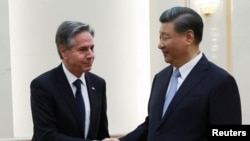U.S. Secretary of State Antony Blinken met Monday with Chinese President Xi Jinping in Beijing on the second and final day of a visit aimed at stabilizing relations between the two powers.
The session held at the Great Hall of the People was the source of speculation ahead of Blinken’s trip and only publicly confirmed about an hour before it took place. It lasted for about 35 minutes.
“President Biden asked me to travel to Beijing because he believes that the United States and China have an obligation and responsibility to manage our relationship,” Blinken told Xi. “The United States is committed to doing that. It’s in the interest of the United States, in the interests of China, and in the interest of the world.”
Blinken is the highest level U.S. official to visit China since 2018. His trip was rescheduled from February after a Chinese surveillance balloon flew through U.S. airspace.
Blinken met earlier Monday with China’s top diplomat Wang Yi for a three-hour discussion that the State Department described as “candid and productive.”
State Department spokesperson Matthew Miller said in a statement that the Blinken and Wang “addressed a range of bilateral and global issues” as well as “opportunities to explore cooperation on shared transnational challenges.”
“The secretary underscored the importance of responsibly managing the competition between the United States and the PRC through open channels of communication to ensure competition does not veer into conflict,” Miller said. “The secretary reiterated that the United States will continue to use diplomacy to raise areas of concern and stand up for the interests and values of the American people.”
China’s Foreign Ministry said in a statement that Wang told Blinken the meeting came at a critical time in U.S.-China relations, and that it is necessary to “reverse the downward spiral.”
Wang said the most important factor in stabilizing relations between the two countries is mutual respect.
Regarding Taiwan, Wang said the United States must oppose Taiwanese independence and that China has no room to compromise on the issue.
On Sunday, Blinken and Chinese Foreign Minister Qin Gang held "candid" and "direct" talks in Beijing, the State Department said.
During the seven-and-a-half hour meeting, Qin accepted an invitation to come to the United States. Agreement was also reached on more flights between the two countries.
In addition, both sides will continue to work on several issues "at a working level," said a senior State Department official.
Americans wrongfully detained in China
Children of Americans who the U.S. considers wrongfully detained by Chinese authorities asked Blinken to raise their fathers' cases with his Chinese counterparts.
"Behind every hostage is a family suffering every day," said "Bring Our Families Home Campaign" in a tweet Sunday.
"This Sunday will be the 7th time I've missed Father's Day with my dad," said Harrison Li. "Releasing my dad is one of the easiest things that the Chinese government can do to show they are serious about normalizing relations."
Harrison Li's dad, Kai Li, is an American citizen detained in China since September 2016. He was later sentenced to 10 years in prison for espionage, a charge that his family rejects.
Alice Lin is the daughter of American pastor David Lin, who was detained under unclear circumstances in 2006 and later sentenced to life in prison on charges of contract fraud. Lin's family staunchly maintains his innocence. Lin's sentence was later reduced, and he is expected to be released in 2029.
"Secretary Blinken, we miss my dad. Please do everything possible to bring him home," Lin told VOA.
Taiwan
Washington has said China's military escalation in the Taiwan Strait was "a global concern."
A senior State Department official told VOA it is an "abiding interest" of the U.S. to maintain peace and stability across the Taiwan Strait. China is seen as ramping up economic coercion targeting Taiwan ahead of its presidential election.
In May, U.S. Director of National Intelligence Avril Haines told senators that a Chinese invasion of Taiwan could halt the world's largest advanced semiconductor production, wiping out up to $1 trillion per year.
"I will say this number is way too small" because it only costs about 6% of China's gross domestic product, said Chen-Yu Li who is the chief economist of Taishin Financial Holdings in Taiwan.
Li said a military conflict in the Taiwan Strait will affect other Asian economies such as Japan and South Korea, whose GDP totals at least $5 trillion. He also cited the market value of tech giants such as Apple, Nvidia, AMD which Li estimates is at least $3 trillion.
"If Taiwan is under attack, the stock market in the U.S. may vanish $3 trillion," Li said during a May 12 event hosted by the Washington-based Center for Strategic and International Studies.
"If I am Xi Jinping, I'll be very happy to attack Taiwan. It's just 6%."
NGOs push for human rights
In a signed letter to Blinken, 42 nongovernmental organizations urged the top U.S. diplomat to hold the Chinese government accountable for its human rights abuses, citing repression against ordinary people who participated in peaceful protests.
"Hong Kong police detained over 20 people for commemorating the 1989 Tiananmen Massacre after banning the annual Victoria Park candlelight vigil," said the letter.
Some information for this story came from Agence France-Presse and Reuters.





